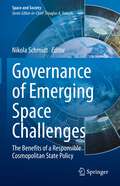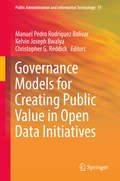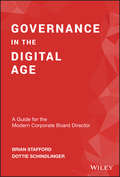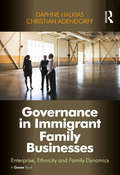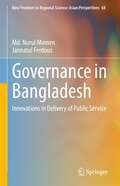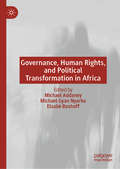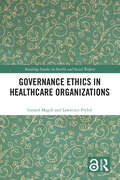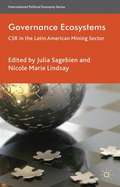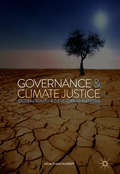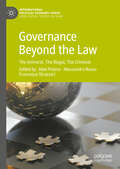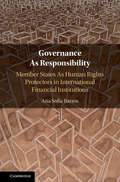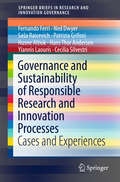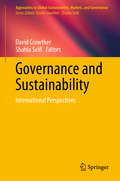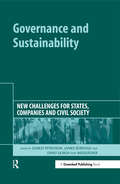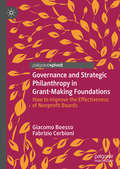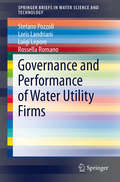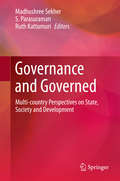- Table View
- List View
Governance of Emerging Space Challenges: The Benefits of a Responsible Cosmopolitan State Policy (Space and Society)
by Nikola SchmidtThis edited volume discusses how even small nation states can make a significant difference in the future of space governance. The book is divided into three main sections covering political theory, case studies, and space technology and applications. Key topics of discussion include planetary defense, space mining, and high-power systems in space. Through these timely subjects, the book presents strategies for developing a truly global governance framework in space, based on the concept of a responsible cosmopolitan state. Authored by a multidisciplinary group of researchers from the Czech Republic, the volume will appeal to other scientific teams and policymakers looking to become pioneers of cosmopolitan space policies at a national and global level.
Governance Models for Creating Public Value in Open Data Initiatives (Public Administration and Information Technology #31)
by Manuel Pedro Rodríguez Bolívar Kelvin Joseph Bwalya Christopher G. ReddickThis book relies on the conceptual model of Open Government (OG), focusing on transparency and, concretely, in open data initiatives at the local government context with the aim of improving participation and collaboration. Most Open Government models are centered on three pillars: transparency, participation and collaboration. Transparency is a crucial ingredient of OG and, applied to data openness means to ensure that the data are well known, comprehensible, easily accessible and open to all. new governance models based on different open data models have not been proposed up to now. The chapter authors seek to contribute recent research to the discussion on governance models of open data initiatives to support Open Governments with the aim of creating public value. It includes both theoretical and empirical studies on governments models in open data initiatives.
Governance in the Digital Age: A Guide for the Modern Corporate Board Director
by Brian Stafford Dottie SchindlingerA new edition of the #1 text in the human computer Interaction field! This book seeks to chart the technology-fueled changes taking place in the field of corporate governance and describes the impact these changes are having on boards and the enterprises they govern. It also describes what the future could look like once companies truly embrace the power of technology to change governance. Additionally, this book will provide a set of "suggested action steps" for companies and their boards focused on ways they can leverage technology tools to enhance governance immediately. Through a review of the latest governance research, interviews with key thought leaders, and case studies of enterprises that have embraced governance technology, readers will be armed with new insights and approaches they can take to enhance the work of their boards and senior leaders to reach new levels of performance. Explains how to use design and evaluation techniques for developing successful interactive technologies Demonstrates, through many examples, the cognitive, social and affective issues that underpin the design of these technologies Provides thought-provoking design dilemmas and interviews with expert designers and researchers Uses a strong pedagogical format to foster understanding and enjoyment An accompanying website contains extensive additional teaching and learning material including slides for each chapter, comments on chapter activities, and a number of in-depth case studies written by researchers and designers.
Governance in the Digital Age: A Guide for the Modern Corporate Board Director
by Brian Stafford Dottie SchindlingerA new edition of the #1 text in the human computer Interaction field! This book seeks to chart the technology-fueled changes taking place in the field of corporate governance and describes the impact these changes are having on boards and the enterprises they govern. It also describes what the future could look like once companies truly embrace the power of technology to change governance. Additionally, this book will provide a set of "suggested action steps" for companies and their boards focused on ways they can leverage technology tools to enhance governance immediately. Through a review of the latest governance research, interviews with key thought leaders, and case studies of enterprises that have embraced governance technology, readers will be armed with new insights and approaches they can take to enhance the work of their boards and senior leaders to reach new levels of performance. Explains how to use design and evaluation techniques for developing successful interactive technologies Demonstrates, through many examples, the cognitive, social and affective issues that underpin the design of these technologies Provides thought-provoking design dilemmas and interviews with expert designers and researchers Uses a strong pedagogical format to foster understanding and enjoyment An accompanying website contains extensive additional teaching and learning material including slides for each chapter, comments on chapter activities, and a number of in-depth case studies written by researchers and designers.
Governance in Immigrant Family Businesses: Enterprise, Ethnicity and Family Dynamics
by Daphne Halkias Christian AdendorffFamily businesses constitute some of the most unique, complex, and dynamic systems in modern society. The blending of the performance-based world of business and the emotion-based domain of the family creates a system potentially fraught with confusion and conflict. The significant rise in immigrant family businesses adds a further level of complexity to this mix. Research into immigrant family businesses has been based on traditional, limited views of entrepreneurship largely ignoring the ethnic and family contexts that create the culture from which entrepreneurship emerges, making it impossible to understand the complex and interdependent relationships between an owning family, its firm, its governance and the community context in which the firm operates. These firms possess features that make their governance a challenging task. They depict a complex stakeholder structure, whereby the ownership stakes are passed from one generation to the next. The owning family's members usually play multiple roles, thereby blurring governance relationships. Governance in Immigrant Family Businesses explores the relationship between ethnic cultural influence in family businesses and its impact on corporate governance, addressing the intertwined influences of contractual, relational and cultural governance mechanisms and sets out a comprehensive theoretical model which clarifies the complexities involved in business planning, family harmony, and ethnic cultural variables. The authors specifically identify the implications for research, education, and practice. Application of their model will be of value to policy makers, consultants, business researchers and educators.
Governance in Higher Education: Global Reform and Trends in the MENA Region
by Nehme Azoury Georges YahchouchiOver the years, the education sector has witnessed substantial transformations and developments, driven primarily by the rapid growth of technology and inventive pedagogical approaches. In the MENA region, these changes have been particularly noteworthy, as educational institutions are striving to keep pace with global advancements while addressing unique regional challenges. Set against this context, this book delves into two pivotal dimensions that have surfaced as vital for thriving in today's educational sphere, with a strong emphasis on the MENA region's distinct characteristics and opportunities. The first dimension explores the evolution and challenges in governance, encompassing the organizational frameworks, decision-making mechanisms, and policies that empower educational institutions in the MENA region to adapt to the shifting environment. The second dimension zeroes in on the metamorphosis of education itself, emphasizing the innovative tools, assignments, and methodologies that are accessible to educators in the region, and discussing the balance between these elements and effective university governance. By offering an exhaustive and up-to-date examination of these two dimensions, this book imparts invaluable insights and pragmatic guidance to educational professionals, policymakers, and students alike, all with a focus on the MENA region. It aims to equip readers with the knowledge and abilities required to successfully navigate the new educational landscape and excel in the world of academia while highlighting the unique potential and prospects of the region's educational institutions.
Governance in Bangladesh: Innovations in Delivery of Public Service (New Frontiers in Regional Science: Asian Perspectives #68)
by Md. Nurul Momen Jannatul FerdousThis book adopts the multidimensional nature of innovation as its point of focus and offers a comprehensive analysis of contemporary governance issues in Bangladesh. Each chapter views those issues from its own disciplinary perspective, but all share a common focus on the current process in the governance of innovation. The authors show how the processes of innovation and public service delivery are influenced while there is simultaneously a striving for a digital Bangladesh. The book presents innovation as a complex phenomenon with multidisciplinary viewpoints affecting its governance. As well, new practices, developments, and empirical research are shown here. The aim is to point out the most persistent difficulties in public administration and public service delivery, with an emphasis on how to deliver public service in Bangladesh in a sustainable manner. Although significant transformations have been made recently for a better organized public sphere, public services still must be more closely in line with what citizens need rather than what service providers are prepared to deliver. This published work speaks strongly to a wide-ranging audience, from scholars of governance and innovation management to academics, researchers, and postgraduate students interested in public service delivery innovations in Bangladesh and South Asia. Indeed, the book serves as a text and valuable resource for postgraduate courses in politics, business administration, economics, political science, development, and governance in South Asia.
Governance, Human Rights, and Political Transformation in Africa
by Michael Addaney Michael Gyan Nyarko Elsabé BoshoffThis edited volume examines the development and challenges of governance, democracy, and human rights in Africa. It analyzes the emerging challenges for strengthening good governance in the region and explores issues related to civil, political, economic, cultural, and social rights highlighting group rights including women, girls, and other minority groups. The project presents a useful study of the democratization processes and normative developments in Africa exploring challenges in the form of corruption, conflict, political violence, and their subsequent impact on populations. The contributors appraise the implementation gap between law and practice and the need for institutional reform to build strong and robust mechanisms at the domestic, regional, and international levels.
Governance for Nonprofits: A Board of Directors Guide to a Profitable Not-for-Profit Corporation
by Ted E. DeGrootNonprofit governance is like sports officiating. Umpires and referees don’t play the game. They manage the game. That's what governance does for a nonprofit organization. People assigned to governance oversee how the organization is managed and work to ma
Governance Ethics in Healthcare Organizations (Routledge Studies in Health and Social Welfare)
by Gerard Magill Lawrence PrybilDrawing on the findings of a series of empirical studies undertaken with boards of directors and CEOs in the United States, this groundbreaking book develops a new paradigm to provide a structured analysis of ethical healthcare governance. Governance Ethics in Healthcare Organizations begins by presenting a clear framework for ethical analysis, designed around basic features of ethics – who we are, how we function, and what we do – before discussing the paradigm in relation to clinical, organizational and professional ethics. It goes on to apply this framework in areas that are pivotal for effective governance in healthcare: oversight structures for trustees and executives, community benefit, community health, patient care, patient safety and conflicted collaborative arrangements. This book is an important read for all those interested in healthcare management, corporate governance and healthcare ethics, including academics, students and practitioners.
Governance Ethics: Global value creation, economic organization and normativity
by Josef WielandThis book investigates the functioning and effects of moral rules and values as endogenous elements of governance structures when applied to economic and social transactions. The point of departure and framework of this book is Josef Wieland's theory of Ethics of Governance. Its focal point is the governance of the normative aspects of corporations. The Ethics of Governance is a comparative research project on business and economic ethics which started 15 years ago. Divided into five chapters, the book provides a comprehensive insight into the theoretical foundation and application-oriented results of the research project. It covers theoretical, conceptual and practical challenges in the global economy with regard to a sustainable economy, the social responsibility of corporations, and their transcultural and normative management. By offering comprehensive insight into the research results of the Ethics of Governance project, this book provides a unique scientific work on business and economic ethics.
Governance Ecosystems
by Julia Sagebien Nicole Marie LindsayAs debates rage about the responsibilities of business and government in global extractives industries, there remains a significant lack of empirical research and theoretical analysis focused on the dynamics of resource extraction, governance and corporate social responsibility. This collection takes a broad, 'governance ecosystem' view to exploring the complex and cross-cutting relationships between key actors involved in and affected by mining governance in Latin America. Case studies include the Kimberley process over conflict diamonds, the PERCAN Initiative in Peru, the Carajas iron ore complex in the Brazilian Amazon, Apex and Empresa Huanuni in Bolivia, and the gold producers Newmont and Goldcorp. "
Governance & Climate Justice: Global South & Developing Nations (Politics, Economics, And Inclusive Development Ser.)
by Julia PuaschunderThis book examines international climate change mitigation and adaptation regimes with the aim of proposing fair climate stability implementation strategies. Based on the current endeavors to finance climate change mitigation and adaptation around the world, the author introduces a 3-dimensional climate justice approach to share the benefits and burdens of climate change equitably within society, across the globe and over time.
Governance Beyond the Law: The Immoral, The Illegal, The Criminal (International Political Economy Series)
by Abel Polese Alessandra Russo Francesco StrazzariThis volume explores the continuous line from informal and unrecorded practices all the way up to illegal and criminal practices, performed and reproduced by both individuals and organisations. The authors classify them as alternative, subversive forms of governance performed by marginal (and often invisible) peripheral actors. The volume studies how the informal and the extra-legal unfold transnationally and, in particular, how and why they have been/are being progressively criminalized and integrated into the construction of global and local dangerhoods; how the above-mentioned phenomena are embedded into a post-liberal security order; and whether they shape new states of exception and generate moral panic whose ultimate function is regulatory, disciplinary and one of crafting practices of political ordering.
Governance As Responsibility: Member States As Human Rights Protectors in International Financial Institutions
by Ana Sofia BarrosThis book undertakes a specialised analysis of a topic that is highly significant both theoretically and practically. At the theoretical level, it discusses questions that have remained insufficiently answered in the fields of international human rights and institutional law. Notably, it clarifies how international human rights law conditions member states' governance role within international financial institutions and how this role is to be accommodated in the regime of international responsibility. Furthermore, the book's thorough discussion of member states' human rights due diligence duties offers a practical contribution to the understanding of what tools may be used by states to secure their human rights obligations when participating in international financial institutions. Its practical significance also relates to the examination of the various elements that must be demonstrated by an individual wishing to invoke member State responsibility for alleged human rights violations in the context of international financial institution operations.
Governance and Sustainability of Responsible Research and Innovation Processes: Cases and Experiences (SpringerBriefs in Research and Innovation Governance)
by Hans Thor Andersen Fernando Ferri Ned Dwyer Saša Raicevich Patrizia Grifoni Husne Altiok Yiannis Laouris Cecilia SilvestriThis book provides methods and practical cases and experiences with the aim of stimulating Responsible Research and Innovation (RRI) through the direct engagement of researchers, Civil Society Organisations (CSOs), citizens, industry stakeholders, policy and decision makers, research funders and communicators. The book furthermore aims to advance debate on Responsible Research and Innovation and also to reinforce the RRI community identity. With chapters covering governance, public engagement and inclusion in responsible R&D and innovation processes; RRI actions in science education and communication; gender and ethical issues in RRI initiatives; and sustainability of RRI processes, the book is solidly part of the Europe 2020 strategy to promote a vision for a stronger collaborations between social, natural and physical scientists and the societal actors for a wider dimensions of science and innovation and the role in environmental preservation.
Governance and Sustainability: International Perspectives (Approaches to Global Sustainability, Markets, and Governance #8)
by David Crowther Shahla SeifiThis book explores the concepts of sustainability and governance in relation to the governance of corporations – hence the ubiquity of the term corporate governance – and other bodies. It examines how these concepts are regularly used by politicians and by the media. The two concepts are however largely treated as being separate and discrete, and given equal coverage. The argument in this book is that the two concepts are inter-related and that good governance is a prerequisite for sustainability. The focus of the book therefore is different from most, as it seeks to integrate these two important issues.The approach used in this book is based on the tradition of the Social Responsibility Research Network – a worldwide body of scholars that, over its 20-year history, has sought to broaden the discourse and to treat all research as inter-related and business-relevant.The book examines diverse aspects of the changes to corporate and institutional behaviour that have recently manifested by focusing on these two aspects of sustainable development. Thus, the authors explore engagement and partnership between organisations, in order to consider the extent to which the focus has changed so much that we need to think about new approaches to our understanding of sustainability and differing effects in practice. The international mix of authors makes this an original contribution, sharing some of the best ideas from around the world.
Governance and Sustainability: New Challenges for States, Companies and Civil Society
by Ulrich Petschow James Rosenau Ernst Ulrich von WeizsäckerSustainability cannot be achieved without good governance. The Johannesburg World Summit on Sustainable Development in 2002 stated that governance and sustainable development are intimately tied together and the future role and architecture of institutions, from local to international levels, will be crucial determinants to whether future policies and programmes for sustainable development will succeed. But these are changing times. With growing tensions over both globalization and regionalization, traditional systems of regulation are being subjected to growing pressure for reform. While states will continue to play a significant, if changed, role in the future, the importance of players from business and civil society is increasing. Sustainable development requires this change. Such an intra- and intergenerational concept cannot be achieved with a top-down approach, but rather needs the participation of all. In fact, the governance of sustainable development requires the exploration of new forms of both social co-operation and confrontation. By doing so, the different levels (global and local), players (state, company and civil society), control structures (hierarchy, market and public-private) and fields of action need to be taken into consideration.Governance and Sustainability examines the possibilities of integrating the environmental, social and economic dimensions of sustainable development within the framework of governance processes and how that might steer societies towards sustainability. It takes a close look at the key actors, their agendas and methods, forms of organization, problems and limits, as well as real-life examples for governance in different areas of society at the regional, national and international level. It is especially interested in exploring the nature of changes in the context of governance; the role of actors in such processes; and analysing how different forms of societal learning can improve governance processes. It concludes that this is a continuous process, characterized by conflicts and learning processes necessary to heighten both awareness of the complexity of the social and environmental problems faced and the prospects of implementing successful solutions. Based on a major conference hosted to assess the issue of governance post-Johannesburg, the book includes innovative insights from some of the leading thinkers in both sustainable development and governance from academia, business, multilateral organizations and NGOs. It provides a unique perspective on two of the key societal problems facing the world today.
Governance and Strategic Philanthropy in Grant-Making Foundations: How to Improve the Effectiveness of Nonprofit Boards
by Giacomo Boesso Fabrizio CerbioniThis book discusses the role of grant-making foundations in supporting local communities, and how effective governance can contribute to greater success of the social projects they finance. The book considers the extent to which granting foundations act as social investment banks or strategic philanthropists, and identifies possible areas of evolution and improvement in the granting process of foundations similar to other innovative firms. It seeks to explore the possibility of foundations becoming a reference point in the Third Sector for innovativeness and risk taking.
Governance and Regulation in Social Life: Essays in Honour of W.G. Carson
by Augustine Brannigan George PavlichComprising fourteen articles by leading international contributors, including some of the most prominent socio-legal and criminological scholars working in the field, this volume is currently the only work available that critically examines W.G. Carson and his crucial influence in the turn towards sociological approaches to criminology and a criminological interest in governance and social control. The 1970s witnessed an epiphany in the sociological understanding of crime in Britain. The correctional perspective, which assumed crimes had inherent or essential qualities that distinguished them from other acts, was superseded by the analysis of how social events came to be defined as so harmful and repugnant as to require criminalization. This shift in perspectives was exemplified in W.G. Carson’s work, which combines a Marxist acknowledgement of the imperative for profit with a symbolic interactionist attention to the restraining effect of prestige and status among producers and regulators. This key work is an essential read for postgraduates and researchers studying and researching in the areas of criminology and law.
Governance and Performance of Water Utility Firms
by Stefano Pozzoli Loris Landriani Luigi Lepore Rossella RomanoIn Italy, the debate about the reform process, that has involved the water sector for several years, cannot be considered concluded. It seems exclusively ideological and often it does not consider the business administration perspective, which certainly could make a contribution to the solution of different problems. Politicians and researchers, for example, show very little interest for the economic and financial performance of water utility firms, focusing almost exclusively on the different ways for providing the services or on the ownership structure. This work analyzes the variables characterizing the outsourcing process in the water sector. It also explores the connection of such variables with the performance of companies and local government authorities involved in the delivery process. Subsequently, the work explains the results of an exploratory analysis of different cases in the international context, making also a comparison about the performance. Lastly, the work verifies the existence of some best practices and evaluates the adaptability of these best practices in the Italian context.
Governance and Leadership in Health and Safety: A Guide for Board Members and Executive Management
by Waddah S. Ghanem Al Hashmi Bob ArnoldThis book is a leadership guide to the effective implementation of the ISO 45001:2018 standard. It takes the high-level leadership and top management principles put forward in ISO 45001 and develops them into a comprehensive discourse on how, at the very top of any organization, large or small, leaders can drive the occupational health and safety (OH&S) agenda and ensure the effective implementation of the OH&S management systems. While the standard sets out expectations for top management, this book provides a clear explanation of the OH&S roles, responsibilities, and accountabilities between those who direct the organization and drive it towards achieving its strategic aims and those who lead the day-to-day operations. It puts forward a purposeful, easy-to-follow, and effective system for the implementation of ISO 45001 whilst also, and more importantly, maximizing the value proposition of such a global standard, regardless of industry. The book is written for top management teams of both non-executive and executive leadership, as well as senior advisors, in all organizations seeking to effectively implement OH&S policies and management systems. It can also be utilized to create training and learning materials to assist with implementation.
Governance and Governed
by S. Parasuraman Madhushree Sekher Ruth KattumuriBuilding, largely, on insights from India, and case studies in Brazil, China, and South Africa, this book provides insights into the contested topic of 'governance and governed' from a state-society inter-relationship perspective. It argues that the centrality of an understanding of state-governance today is rooted in concerns regarding diversities and contingencies of concrete political reality to address inequalities, exclusion and vulnerabilities. These countries are part of the BRICSs consortium, and have been recognised for their growth potential in the world economy. But their economic progress alone may not necessarily translate into a better quality of life. The approach here is not to focus on a particular understanding of governance, but to utilise a wider lens to understand the nature and extent of incremental processes in the different case-study contexts in order to offer a broader framework for procedural and substantive understanding of governance, rather than a prescription of a government and its activity of governing. The focus is on deriving practical lessons about governance process that are of interest to the wider development community.
Governance and Fund Management in the Chinese Pension System
by Gregorio Impavido Yu-Wei Hu Xiaohong LiA report from the International Monetary Fund.
